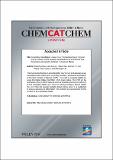Files in this item
Covalently immobilized lipase on a thermoresponsive polymer with an upper critical solution temperature as an efficient and recyclable asymmetric catalyst in aqueous media
Item metadata
| dc.contributor.author | Lou, Lan-Lan | |
| dc.contributor.author | Qu, Huaxin | |
| dc.contributor.author | Yu, Wenjun | |
| dc.contributor.author | Wang, Bei | |
| dc.contributor.author | Ouyang, Lezi | |
| dc.contributor.author | Liu, Shuangxi | |
| dc.contributor.author | Zhou, Wuzong | |
| dc.date.accessioned | 2019-02-01T00:33:44Z | |
| dc.date.available | 2019-02-01T00:33:44Z | |
| dc.date.issued | 2018-03-07 | |
| dc.identifier | 251699527 | |
| dc.identifier | 14e94b4a-cfda-434e-b440-53209113f6c5 | |
| dc.identifier | 85041207981 | |
| dc.identifier | 000426844600040 | |
| dc.identifier.citation | Lou , L-L , Qu , H , Yu , W , Wang , B , Ouyang , L , Liu , S & Zhou , W 2018 , ' Covalently immobilized lipase on a thermoresponsive polymer with an upper critical solution temperature as an efficient and recyclable asymmetric catalyst in aqueous media ' , ChemCatChem , vol. 10 , no. 5 , pp. 1166-1172 . https://doi.org/10.1002/cctc.201701512 | en |
| dc.identifier.issn | 1867-3899 | |
| dc.identifier.other | Bibtex: urn:62b1f53e6059e38b97c234c574249142 | |
| dc.identifier.other | ORCID: /0000-0001-9752-7076/work/58055023 | |
| dc.identifier.uri | https://hdl.handle.net/10023/16982 | |
| dc.description | This work was financially supported by the National Natural Science Foundation of China (Grant No. 21203102), the Tianjin Municipal Natural Science Foundation (Grant No. 14JCQNJC06000), China Scholarship Council (Grant No. 201606200087), MOE (IRT13R30) and 111 Project (B12015). | en |
| dc.description.abstract | A thermoresponsive lipase catalyst with an upper critical solution temperature (UCST) of about 26 °C was exploited by covalent immobilization of an enzyme, Pseudomonas cepacia lipase (PSL), onto poly(acrylamide-co-acrylonitrile) via glutaraldehyde coupling. The experimental conditions for the PSL immobilization were optimized. The immobilized PSL was much more stable for wide ranges of temperature and pH than the free PSL. The material was also evaluated as an asymmetric catalyst in the kinetic resolution of racemic α-methylbenzyl butyrate at 55 °C in an aqueous medium and exhibited high catalytic performance and stability. Up to 50% conversion and 99.5% product enantiomeric excess were achieved, thus providing highly pure enantiomers. More importantly, this biocatalyst could be easily recovered by simple decantation for reuse based on temperature-induced precipitation. It showed good reusability and retained 80.5% of its original activity with a well reserved enantioselectivity in the 6th cycle. This work would shed light on the future development of new UCST-type enzyme catalysts. | |
| dc.format.extent | 3682109 | |
| dc.language.iso | eng | |
| dc.relation.ispartof | ChemCatChem | en |
| dc.subject | Immobilization | en |
| dc.subject | Lipase from Pseudomonas cepacia | en |
| dc.subject | Thermoresponsive polymer | en |
| dc.subject | Upper critical solution temperature | en |
| dc.subject | Kinetic resolution | en |
| dc.subject | QD Chemistry | en |
| dc.subject | NDAS | en |
| dc.subject.lcc | QD | en |
| dc.title | Covalently immobilized lipase on a thermoresponsive polymer with an upper critical solution temperature as an efficient and recyclable asymmetric catalyst in aqueous media | en |
| dc.type | Journal article | en |
| dc.contributor.institution | University of St Andrews. School of Chemistry | en |
| dc.contributor.institution | University of St Andrews. EaSTCHEM | en |
| dc.identifier.doi | https://doi.org/10.1002/cctc.201701512 | |
| dc.description.status | Peer reviewed | en |
| dc.date.embargoedUntil | 2019-02-01 |
This item appears in the following Collection(s)
Items in the St Andrews Research Repository are protected by copyright, with all rights reserved, unless otherwise indicated.

